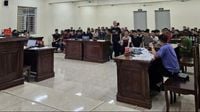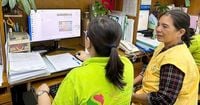In 2024, the Hanoi Center for Legal Aid has made significant strides in ensuring legal support for vulnerable populations by actively implementing the 2017 Legal Aid Law. This initiative is part of broader national programs aimed at assisting various groups, including the elderly and low-income individuals, as well as ethnic minorities and people with disabilities.
According to Nguyen Tu Anh, the Director of the Hanoi State Legal Aid Center, the center has seen a remarkable increase in the number of legal aid cases. From 2020 to 2024, a total of 8,779 legal aid cases involving litigation were concluded. In 2024 alone, the center participated in 3,284 litigation cases, providing defense and protection for an equal number of individuals eligible for legal aid. This marks a 13.2% increase (383 cases) compared to the same period in 2023.
The total number of cases involving litigation in 2024, including those accepted during the year and those carried over from previous years, reached 4,713, which is 584 cases higher than in 2023. This surge in legal aid activities has positioned Hanoi as one of the leading localities in the country for legal aid involvement in litigation.
One notable case in March 2024 involved the prosecution of 28 individuals by the Ha Dong District Police for the crime of "Causing public disorder." Of these, 22 defendants were eligible for legal aid. In response, the center appointed five legal aid providers to defend these individuals, ensuring that their rights were protected during the legal proceedings.
Moreover, the center has been proactive in ensuring that those who are most vulnerable have access to legal services. A key part of their strategy includes a program signed in collaboration with law enforcement to provide legal aid during criminal investigations. This initiative aims to assist individuals who are suspects, detained, or victims, ensuring they receive timely legal assistance and understand their rights.
In 2024, the Hanoi State Legal Aid Center received 2,691 inquiries from law enforcement agencies, translating into 2,691 legal aid cases. Regardless of holidays or weekends, legal aid providers are available to respond to notifications from investigative authorities, ensuring that vulnerable individuals do not miss out on their right to free legal services.
For instance, when the Ha Dong District Police initiated legal action against young offenders, the center was quick to respond, dispatching legal aid providers to assist in their defense. The commitment of the legal aid staff in Hanoi has played a crucial role in safeguarding the legal rights of those in need.
On a different front, the Chợ Rẫy Hospital in Ho Chi Minh City has also implemented a new model to assist underprivileged patients in obtaining health insurance (BHYT). The hospital's management aims to ensure that all patients have access to timely medical services and can benefit from health insurance, aligning with the government's principle of leaving no one behind.
Under this model, clinical departments actively guide the families of newly admitted patients to the Social Work Department to help them navigate the health insurance enrollment process. In cases where patients face financial difficulties, the hospital's social work team can provide 100% coverage for the health insurance fee, utilizing funds raised from charitable donations.
During the first week of implementing this model, the Chợ Rẫy Hospital successfully assisted 12 cases. Specifically, two cases required help with health insurance enrollment, while ten cases needed both enrollment assistance and financial support for the health insurance fee, which amounts to 1,263,600 VND for a full year.
Deputy Minister of Health Nguyen Tri Thuc highlighted that although Vietnam has achieved a relatively high health insurance coverage rate of over 94% of the population, there are still many individuals from low-income backgrounds who remain uncovered. He emphasized the importance of helping vulnerable patients access health insurance, stating, "This is a very meaningful task."
Thanks to advancements in digital transformation and various applications, the Chợ Rẫy Hospital can now efficiently support patients from all provinces in the country, ensuring they receive timely assistance. Previously, the process of helping patients obtain health insurance was time-consuming. However, with the current system in place, it has become much easier and more convenient.
Deputy Minister Thuc expressed his hope that this model will be studied and widely implemented in more hospitals across the country. He believes that ensuring timely access to health insurance for vulnerable patients is not only a humanitarian effort but also helps mitigate the risk of poverty and contributes to the goal of universal health coverage.
Both the Hanoi Center for Legal Aid and Chợ Rẫy Hospital exemplify the commitment to supporting vulnerable populations in Vietnam. By ensuring access to legal aid and health insurance, these institutions are playing a vital role in promoting social justice and equity in healthcare and legal services.



